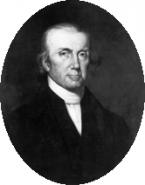
John Taylor on how a “sound freedom of property” can destroy the threat to Liberty posed by “an adoration of military fame” and oppressive governments (1820)
About this Quotation:
This work by Taylor, Construction Construed and Constitutions Vindicated (1820) is considered by some historians of political thought to be the greatest single work on political philosophy written by an American during the 19th century.
Other quotes from this week:
- 2009: James Mill on the natural disposition to accumulate property (1808).
- 2008: Tom Paine on the "Decline and Fall of the English System of Finance" (1796)
- 2007: James Madison argues that the constitution places war-making powers squarely with the legislative branch; for the president to have these powers is the “the true nurse of executive aggrandizement” (1793)
- 2005: Bernard Mandeville uses a fable about bees to show how prosperity and good order comes about through spontaneous order (1705)
Other quotes about Property Rights:
- 2009: James Mill on the natural disposition to accumulate property (1808).
- 2008: Lysander Spooner spells out his theory of “mine and thine”, or the science of natural law and justice, which alone can ensure that mankind lives in peace (1882)
- 2008: Sir William Blackstone argues that occupancy of previously unowned land creates a natural right to that property which excludes others from it (1753)
- 2008: Alexis de Tocqueville stood up in the Constituent Assembly to criticize socialism as a violation of human nature, property rights, and individual liberty (1848)
- 2008: Lord Kames states that the “hoarding appetite” is part of human nature and that it is the foundation of our notion of property rights (1779)
- 2007: Thomas Hodgskin argues for a Lockean notion of the right to property (“natural”) and against the Benthamite notion that property rights are created by the state (“artificial”) (1832)
- 2007: J.B. Say on the self-evident nature of property rights which is nevertheless violated by the state in taxation and slavery (1817)
- 2004: Wolowski and Levasseur argue that Property is “the fruit of human liberty” and that Violence and Conquest have done much to disturb this natural order (1884)
6 September, 2004
 | John Taylor on how a “sound freedom of property” can destroy the threat to Liberty posed by “an adoration of military fame” and oppressive governments (1820) |
In 1820 Taylor was concerned that the promise of the American constitution, to radically limit the power of the central state, was being undermined by interventionist economic policies:
An adoration of military fame, specious projects and eminent individuals, has in all ages brought on mankind a multitude of evils; and a sound freedom of property is the only mode that I know of, able to destroy the worship of these idols, by removing beyond their reach the sacrifices upon which themselves, and their proselytes, subsist.
The full passage from which this quotation was taken can be be viewed below (front page quote in bold):
THESE are the keys of construction, and the locks of liberty. The question to be considered is, whether our revolution was designed to establish the freedom both of religion and property, or only of the former.
It is strange that the human mind should have been expanded in relation to religion, and yet should retain narrow notions in relation to property. Objects unseen, and incapable of being explained by the information of the senses, afford less perfect materials for the exercise of reason, than those capable of being investigated by evidence, within the scope of the human understanding. As the difficulties opposed to the correction of religious fanaticism seemed less surmountable, whilst its effects were more pernicious, the zeal of philosophers was condensed in an effort to relieve mankind from an evil the most distressing; and their attention was diverted from another, at this period the most prominent. But having wrested religious liberty from the grasp of fanaticism, it now behooves them to turn their attention towards pecuniary fanaticism, and to wrest civil liberty from its tyranny also. Between an absolute power in governments over the religion and over the property of men, the analogy is exact, and their consequences must therefore be the same. Freedom of religion being the discovery by which religious liberty could only be established; freedom of property must be the only means also, for the establishment of civil liberty. Pecuniary fanaticism, undisciplined by constitutional principles, is such an instrument for oppression, as an undisciplined religious fanaticism. A power in governments to regulate individual wealth, will be directly guided by those very motives, which indirectly influenced all governments, possessed of a power to regulate religious opinions and rites. If we have only restrained one of these powers, we have most improvidently retained the other, under which mankind have groaned in all ages; and which at this time is sufficient to oppress or enslave the European nations, although they have drawn some of the teeth of religious fanaticism. An adoration of military fame, specious projects and eminent individuals, has in all ages brought on mankind a multitude of evils; and a sound freedom of property is the only mode that I know of, able to destroy the worship of these idols, by removing beyond their reach the sacrifices upon which themselves, and their proselytes, subsist.